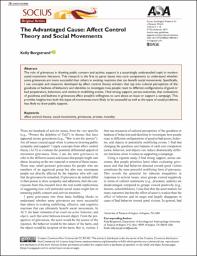
ATTENTION: The works hosted here are being migrated to a new repository that will consolidate resources, improve discoverability, and better show UTA's research impact on the global community. We will update authors as the migration progresses. Please see MavMatrix for more information.
Show simple item record
| dc.contributor.author | Bergstrand, Kelly | |
| dc.date.accessioned | 2020-11-06T16:28:45Z | |
| dc.date.available | 2020-11-06T16:28:45Z | |
| dc.date.issued | 2019 | |
| dc.identifier.issn | 2378-0231 | |
| dc.identifier.uri | http://hdl.handle.net/10106/29584 | |
| dc.description.abstract | **Please note that the full text is embargoed** ABSTRACT: The role of grievances in drawing public concern and activist support is a surprisingly understudied topic in modern
social movement literature. This research is the first to parse issues into core components to understand whether
some grievances are more successful than others in evoking reactions that can benefit social movements. Specifically,
I use concepts and measures developed by affect control theory scholars that tap into cultural perceptions of the
goodness or badness of behaviors and identities to investigate how people react to different configurations of good or
bad perpetrators, behaviors, and victims in mobilizing events. I find strong support, across outcomes, that evaluations
of goodness and badness in grievances affect people’s willingness to care about an issue or support a campaign. This
provides insights into both the types of movements more likely to be successful as well as the types of social problems
less likely to draw public support. [This is a published version of an article published by
SAGE Publications in Socius. © The Author(s) 2019. Article reuse guidelines: sagepub.com/journals-permissions
DOI: 10.1177/2378023119841811] | en_US |
| dc.language.iso | en_US | en_US |
| dc.publisher | SAGE Publications | en_US |
| dc.relation.ispartofseries | Socius: Sociological Research for a Dynamic World (Socius);Volume 5: 1– 15 | |
| dc.subject | affect control theory | en_US |
| dc.subject | social movements | en_US |
| dc.subject | grievances | en_US |
| dc.subject | protest | en_US |
| dc.subject | morality | en_US |
| dc.title | The Advantaged Cause: Affect Control Theory and Social Movements | en_US |
| dc.type | Article | en_US |
Files in this item
- Name:
- Bergstrand_Advantaged Cause.pdf
- Size:
- 881.4Kb
- Format:
- PDF
- Description:
- PDF
This item appears in the following Collection(s)
Show simple item record


